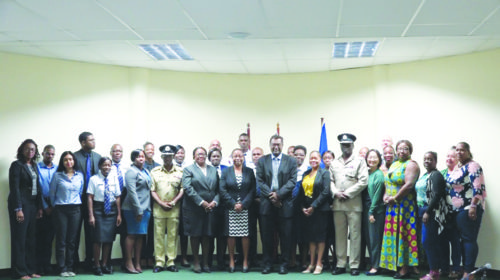
…SOP launched to guide investigators, prosecutors
Over 130 victims of trafficking in persons (TIP) have been recorded for the past eleven months. These were identified from TIP-related cases filed during that period which resulted in eight successful prosecutions.
These figures were revealed by Public Security Minister Khemraj Ramjattan on Wednesday at the launching of Standing Operating Procedures (SOPs) for the Investigation and Prosecution of Trafficking in Persons Cases in Guyana.
He noted that from January to November, the Guyana Police Force’s Trafficking in Persons (TIP) Unit investigated 18 cases with 138 alleged victims and some 50 suspects. Twenty-nine charges were filed against the perpetrators of which eight were convicted.
According to Ramjattan, who is also the Chairman of the Ministerial Taskforce on TIP, this is a significant improvement compared to previous years.
Last year, there were a total of 245 alleged TIP victims from 32 cases with 57 suspects. This resulted in 17 TIP-related charges filed compared to only one in 2017.
Over the past 11 months, all 138 victims were females with 115 below the age of 30 and seven below the age of 18. Like in the previous years, Region Four (Demerara-Mahaica) continues to account for the highest prevalence of TIP-related activities, with 87 per cent of the total cases recorded thus this year.
Foreigners rank high
Meanwhile, foreigners continue to rank high among the TIP victims with 84 per cent of those recorded being Venezuelans. Of the total recorded to date this year, four are from the Dominican Republic and 11 are Guyanese.
“It is important for you to understand these statistics… because it also identifies a number of areas that you have to pay more attention to – young people under the age of [30] and females and their location,” he asserted.
The Public Security Minister went on to say that like in the previous years, most of these victims are being exploited sexually but there are increasing cases of labour exploitation as well.
“I believe that there might be a number of our Amerindian girls who are called out from the hinterland to come work for people in Georgetown and other places, who are being hugely exploited and we have to do lots more work [to curb this],” he stated.
On this note, Ramjattan posited that the establishment of these SOPs will help guide law enforcement officers to not only understand and improve on investigating and prosecuting TIP cases but also dealing with victims to reduce or avoid re-traumatisation.
This, he stressed, is timely since Guyana needs to prepare for a possible hike in human trafficking activities as a result of its budding oil and gas industry.
“I believe that we are going to have more of this kind of trafficking in humans happening with an oil and gas industry that is going to make Guyana probably the richest country in the Americas. It is going to be a magnet, this country, for other people all across Latin America and the Caribbean, and if we do not set up the preparatory work to ensure that we are smarter and to know how to deal with them, to identify them, how to prosecute them [then] we are not going to be that successful, notwithstanding that we’re going to have lots of money,” he contended.
While Guyana still remains on the Tier One category of the United States Department of State report on Trafficking in Persons, the country still has a lot more work to do in combatting the scourge and according to Ramjattan, they have already started acting on some of the recommendations made in the report.
The SOPs are aimed at strengthening Guyana’s technical capacity to combat TIP and assist victims of human trafficking.
Attorney Diana Shaw, the Jamaican legal consultant who worked on compiling the document, urged stakeholders to adopt the guidelines, which she explained were built on existing practices here to conform to international standards.
Funded by the US State Department, the Guyana Government worked in collaboration with the International Organisation of Migration (IOM) to establish the SOPs.
IOM’s Regional Coordinating Officer and Chief of Mission of IOM’s Guyana Office, Robert Natiello, noted that while the compilation of the SOPs is a milestone, it is only the beginning. He pointed out that the work now starts in implementing the guidelines.
To this end, Natiello underscored the need for continued stakeholder cooperation in tackling the scourge of human trafficking.
“It’s now that we have to work together for the implementation of the standard operating procedures. This is when the real work begins. Officers who are in charge with prosecuting and investigating cases will really have to quickly become acquainted with the document and they will have to put these guiding principles into practice as Guyana continues to contend with the growing number and the variety of trafficking in persons cases,” the IOM official stated.
In addition to the GPF, among the other stakeholder representatives at Wednesday’s SOP launch were acting Chief Justice Roxane George and Assistant Director at the Director of Public Prosecutions (DPP) Chamber, Teshana Lake, both of whom committed to continue support the fight against human trafficking.
Members of the various stakeholder agencies are expected to undergo training over the coming weeks to familiarise themselves with the SOPs.



